“Funny, sad and true, this is a play that will foster conversation, and save lives.” – The Australian
When managers programme performing arts events for their venues there are many things taken into consideration: demographics of the community, existing audiences, potential audiences, reputation of the performers or the producing company, an opportunity to grow the exposure of performers or the producing company, entertainment value, quality of work, relevance to the local community, political climate, social issues and hot topics. Sometimes art imitates life or holds a mirror up to the audience and reflects something about itself back at it. And sometimes a production can be part of a national conversation. In the case of Fourteen, that was definitely part of the decision-making process. So how and why is a show set in 1999 about a year in the life of a year 9 gay kid at an all-boys catholic school in regional Queensland with a soundtrack of banging 90s songs relevant to Central West NSW in 2024? Incredibly for far too many reasons.
Produced by Shake & Stir Theatre Company in Brisbane and adapted from the award-winning memoir by Shannon Molloy, Fourteen has just kicked off a national tour of Australia starting at Riverside Theatres in Parramatta. Western Sydney, if you remember, had one of the largest number of electorates to vote no in the divisive marriage equality plebiscite in 2017. The electorate of Parramatta voted ‘no’ as did many neighbouring electorates. The electorates of Calare and Parkes in Central West NSW only just got to a yes vote with the overall national vote for ‘yes’ being 60.1%. As a nation we took a step forward for greater equality in this country but too many people then thought that that was it, LGBTQI+ rights were sorted. There had also been significant steps forward following the 58 08 campaign in 2008 when a Human Rights and Equal Opportunity Commission report found 58 pieces of federal legislation that financially discriminated against same-sex couples, and changes were made to fix this. So surely by 2024, the experience of LGBTQI+ kids in schools is very different to 1999? Actually, no.
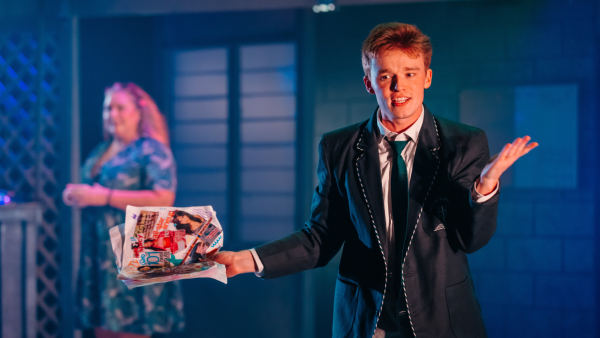
For the past 9 years I have been a volunteer facilitator for a support group in the Blue Mountains for LGBTQI+ young people. Created from an identified need for kids who, despite having more access to more information and support though online resources, seemed to know less than I did in the 90s or Shannon did in 1999, I pulled together a few friends to start the group once I realised nothing in person was available from the various local services focussed on youth. Western Sydney, where I spent my uni days and found community through support groups and dances, had nothing either. In fact, the only place I could see any sort of support for young people was inner city Sydney. The young people who needed support initially were the offspring of my school peers – conversations between them must have opened up to be franker and more honest and knowledgeable by now?! Alas, no.
I’d noticed a young man online, about 14, who was on a dating site he shouldn’t have been trying to connect to others like him. I’d known him for years through tap dancing classes and I felt a sense of responsibility to let him know he wasn’t alone, that he had a friend to chat to if he needed. He’d ticked all sorts of things on his profile which made me question his knowledge. So, when I happened to run into him in the street and said hi, I took the opportunity to ask him about his profile and what he thought was meant by “bondage” as one of the boxes he had ticked. “You know, bonding, get to know one another.” I prompted for his understanding of some other options on the online profile. Clearly education had failed him. His parents had failed him. The access to everything online had failed him. Collectively we were putting this innocent into risky situations he might not realise until it was too late. And it sparked the beginning of the support group idea. The need for one. For him and for others like him. Why didn’t this kid know what he was ticking? Why didn’t he have someone he could ask other than google?! I’m not making a direct connection between bondage and sexual violence, but I am concerned that because we don’t talk about sexual violence enough. And we almost never talk about same-sex sexual violence, and that young same-sex attracted young people can find themselves in situations that they never thought possible, are unclear how to navigate them, and wouldn’t know how to be able to seek help should they have been victim to such violence.
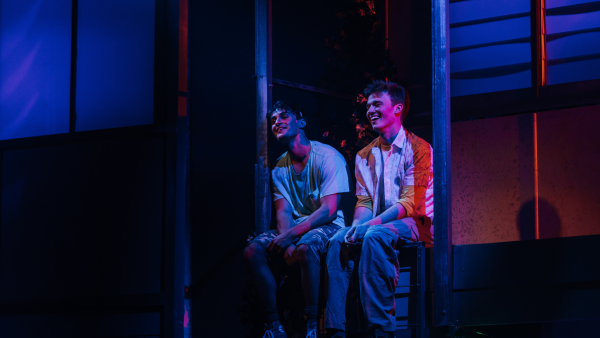
The LGBTQI+ community has operated underground, under the radar, largely through necessity to exist and because it has been forced to. For a young queer person in 1999 in regional Australia the only window into there being others might be snippets of the Mardi Gras parade on the tv which has been curated by the media for shock values. Sequins and feathers, speedos and skin makes for much better visual storytelling than a bunch of ordinary looking people walking down the street who you barely even notice. And, so, the misperception of what all the queers look and behave like is reinforced once again. And the informal scoffing commentary of the lounge room at home reinforces ignorant, misinformed, homophobic attitudes that have more impact than is ever realised. Violence starts with language and we need to change our language.
I’ve listened to many stories from the young people coming through the doors over the last 9 years. Kids who have had to lie about what they are doing, rules about not saying hello in public if I see them in case they are with someone who doesn’t know, threats of violence and intimidation at school or on public transport from others their own age, education professionals refusing to use the correct pronouns or name for transgender kids, or the refusal to allow them to use anything but the accessible bathroom which is always locked and requires a key from the school office. Back in Western Sydney, Cumberland Council has just voted to ban any books with references to same-sex parenting. What message does that send to young queer people? This is now I’m talking about. 2024.
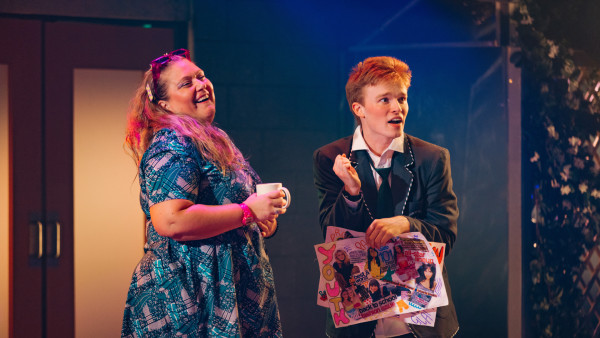
And now I’ve heard in the Central West counsellors have created signs for their doors indicating LGBTQI+ kids are welcome and safe, only to have the signs removed. Or they’ve created a flyer with various support numbers for all sorts of things for young people only to have school management remove anything to do with queer kids. Despite all the changes, all the steps forward for the LGBTQI+ community including marriage equality, despite suicide rates for LGBTQI+ young people being so high particularly in regional communities, we still have schools, educated adults, denying the existence of young queer people or making their lives that much harder for absolutely no good reason. These stories are not just from religiously based schools like the all-boys Catholic school in Fourteen, some of these are public schools.
In 2023, Goulburn’s local council was forced to cancel Rainbow Storytime at the public library because of death threats from some members of the community. In April 2024, similar threats were made for Pride events in Bathurst and Orange.
It appears to me we need to have the conversations about LGBTQI+ people in Australia. We need to talk about the experiences of young queer people, their realities, their hopes and dreams. We need to talk about our collective attitudes and how we can change them. We need to talk about how, despite things getting better in time, perhaps the experience of a year 9 gay boy in regional Queensland in 1999 is not dissimilar to a year 9 gay boy in regional NSW in 2024. That a quarter of a century later things are still very much the same as they were.
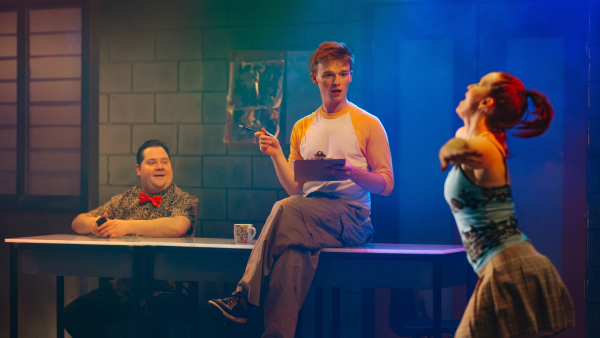
Theatre allows audiences to explore different worlds and societies, ideas they might agree or disagree with, step outside of their own experiences through the safety of their seat. The structure of a play can allow for an emotional rollercoaster that pushes audiences out of their comfort zone one minute but gives them some relief the next. It can have audiences laughing then crying and perhaps crying and laughing at the same time. It can prompt conversation between audience members or inner dialogue with just one person. It is magical, transformative and cathartic. Fourteen does all this and more.
I’ve programmed Fourteen for schools, for young people, to be able to read the book, see the show and get into conversation about things that matter to them. I’ve programmed it for young people to see themselves reflected on stage on a platform that they might have thought isn’t really for them. I’ve programmed it for young people to have conversations with their teachers, their parents and their peers. And I’ve hit a challenge. Teachers won’t teach the book or attend the performance in part because of the subject matter and a scene of same-sex sexual violence, but largely because they don’t want to be subjected to the intimidation of the parents. The same parents who seem to think it’s teachers’ jobs to raise their kids for them, but attack them publicly when they might give the young people in their care the opportunity to learn, to express themselves, and to see the reality of the world through theatre. Young people are watching all sorts of violent, sexualised content on streaming services, social media and video gaming but these same parents have teachers scared to educate turn a blind eye to all of that.
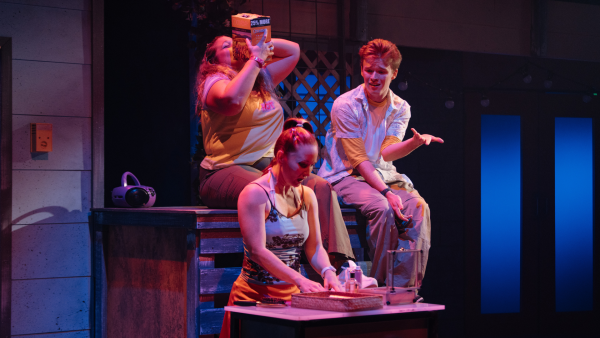
So, why have I programmed Fourteen for audiences at Bathurst Memorial Entertainment Centre? For similar reasons that I’m sure Orange, Dubbo, Port Macquarie, Wyong, Canberra, Parramatta and venues around Queensland have. Shake & Stir Theatre Company have an excellent reputation for creating quality productions. Fourteen will appeal to the traditional theatre going audience at my venue especially those that love a good drama. It will appeal to a young audience who grew up in the 90s and they will love the soundtrack of 90s hits. I’ve programmed it because it will be fun and uplifting, moving and inspiring. I’ve programmed it for that closeted gay kid who might think they are the only person like themselves and doesn’t have a voice yet. And I’ve programmed it to stimulate conversations, to challenge the status quo, to hold up a mirror to the local community and challenge them to look at themselves and ask questions like “Is this the world we live in and is this ok?” and “what change do we need to see in another 25 years?”.
Jonathan Llewellyn
Manager
BMEC
Fourteen plays at BMEC as part of Bathurst Writers’ & Readers’ Festival, May 21 and 22, 2024.
Find out more about the show here.
